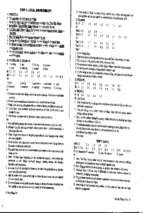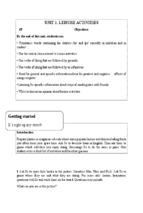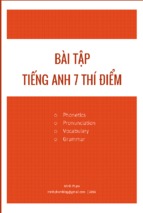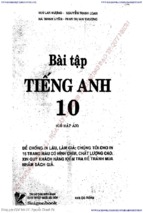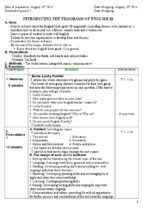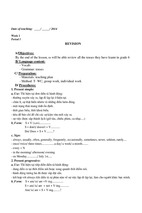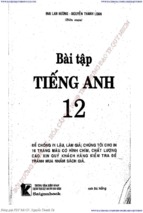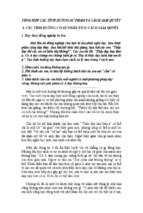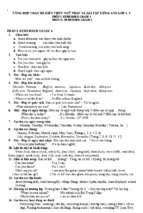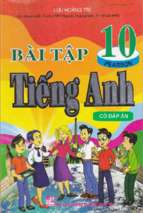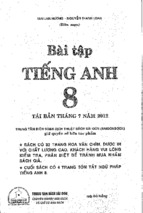TENSES ( Caùc thì )
LESSON 1 :
1. SIMPLE PRESENT: (HTÑ)
Affir :
Neg:
S+V1 /Vs, es
S+ do/ does + not+ V1
Ex : Water boils at 100o c.
Inter:
Do/ does+ S + V1 …?
Ex : How often do you go to school?
Ex : Tom doesn’t feel hungry.
*(Be):am, is, are not ; (have):has/ have not +got = do / does + not + have
Dieãn taû :
Tình caûm, caûm giaùc, nhaän thöùc ôû hñoäng.
Thoùi quen, phong tuïc, taäp quaùn.
Chaân lí, söï thaät hieån nhieân.
Vôùi : EVERY (day, year…), ALWAYS, OFTEN, USUALLY, SOMETIME, SELDOM, RARELY, NEVER,
EVER, ONCE / TWICE / THREE TIMES + ( a day/ week/ month…), all the time, now and then . . ..
Notes : Qui taéc theâm es ñoái vôùi ñoäng töø coù S soá ít :
- Caùc ñoäng töø taän cuøng laø : o, sh, ch, x, s, vaø z .
- Caùc ñoäng töø taän cuøng laø y maø ñöùng tröôùc y laø moät phuï aâm ta ñoåi y i + es
( She studies, Tom tries, He plays . . .).
2. PRESENT CONTINUOUS ( HTTD)
S + am/ is/ are + Ving
S + am/ is/ are + not + Ving
Am/ Is/ Are + S + Ving
?
Dieãn taû :
Vôùi :
Ex: We are studying English now.
Ex: She isn’t writing when he comes.
Ex: What are you doing while I am doing?
Hñoäng ñang xaûy ra ôû Htaïi vaøo luùc noùi vieát.
2 hñoäng ñang keùo daøi // ôû Htaïi (while: trong khi).
1 hñoäng ñang keùo daøi ôû Htaïi thì coù 1 hñoäng ngaén ñoät ngoät xaûy ra(S+ V 1/ Vs, es)
!
AT PRESENT , AT THE MOMENT , NOW, RIGHT NOW, JUST NOW, ,…
3. PRESENT PERFECT: (HTHT)
S + has/ have + V3ed
S + has/ have + not + V3ed
Has/ Have + S + V3ed?
Dieãn taû:
Ex: I’ve just opened the door.
Ex: We have studied English for many years.
Ex: Jack hasn’t come recently.
Ex: How long have you studied English?
Hñoäng Qk ko roõ tg.
Hñoäng vöøa môùi xaûy ra.
Hñoäng baét ñaàu trong Qk, vaãn coøn tieáp tuïc ôû Htaïi & coù theå tieáp tuïc ôû Tlai.
Vôùi: BEFORE, ALREADY, RECENTLY= LATELY, EVER, NEVER, YET , JUST, TWICE, SEVERAL
TIMES, SINCE + moác TG, FOR + khoaûng TG, UP TO NOW=UP TILL NOW=SO FAR…
4. PRESENT PERFECT CONTINUOUS: (HTHTTD)
1
S + has/ have + been + Ving.
S + has/ have + not + been + Ving.
Has/ Have + S + been + Ving?
Dieãn taû:
Ex: We have been studying English for many years.
- Hñoäng baét ñaàu trong Qkhöù, tieáp tuïc ôû Htaïi & coù theå ñeán Tlai
( nhaán maïnh tính lieân tuïc) - since + moác TG ; for + khoaûng TG.
5. SIMPLE PAST (QKÑ)
S + V2ed
S + did + not + V1
Did + S + V1 ?
Ex: I saw him yesterday.
Ex: She didn’t come last week.
Ex: Did Mr. Lee phone an hour ago?
*(Be) : was / were wasn’t, weren’t
Dieãn taû:
- Hñoäng ñaõ xaûy ra & chaám döùt hoaøn toaøn trong Qk ( xaùc ñònh roõ TG)
Vôùi:
- YESTERDAY, AGO ,LAST (night, week, year…)
6. PAST CONTINUOUS (QKTD)
S + was/ were + Ving
Ex: We were watching TV at 7 pm yesterday.
S + was/ were + not + Ving Ex:I was writing while my father was reading.
Was / were + S + Ving ?
Ex: She was sleeping as the telephone rang.
Dieãn taû:
Hñoäng xaûy ra ôû 1 giôø / khoaûng giôø Qk xaùc ñònh ( at 7pm, from 6 to 7, …)
2 hñoäng dieãn ra // ôû Qk. (while: trong khi)
1 hñoäng Qk ñang keùo daøi thì 1 hñ ngaén ñngoät xaûy ra (S + V2ed)
Vôùi: AT THAT TIME, AT THAT MOMENT…
7. PAST PERFECT (QKTD)
S + had + V3ed
Ex: Last night I went to bed after I dad done my homework.
ed
S + had + not + V3
Had + S + V3ed ?
Dieãn taû:
- Hñoäng xaûy ra tröôùc 1 moác TG ôû Qk hoaëc tröôùc 1 hñ Qk
Vôùi :
( tröôùc: S+ had +V3ed ; sau: S + V2)
8. SIMPLE FUTURE (TLÑ)
S + will / shall + V1
Ex: I’ll buy it tomorrow.
S + will / shall + not + V1
Will / Shall + S + V1?
*Note: will not =won’t ; shall not =shan’t.
Dieãn taû:
Hñ seõ xaûy ra trong tlai.
Lôøi yeâu caàu (Will you + V1…? ); Ñeà nghò ( Shall I / we + V1 …?)
Vôùi:
TOMORROW, SOON, NEXT (week, month,…)
9. FUTURE PERFECT (TLHT)
S + will / shall + have + V3ed .
Ex: We’ll have already finished the work by the time you get back tomorrow.
2
Dieãn taû:
Hñoäng seõ hoaøn taát trong tlai.
* Notes:
1) Near future: (Tlai gaàn)
S + am/ is / are + going to + V1 : seõ, saép söûa, döï ñònh…
Ex: I’m going to buy it tomorrow.
2)Moät soá ñoäng töø sau ñaây thöôøng khoâng duøng vôùi thì tieáp dieãn
Be : Ex: I am a student now.
Nhöõng ñoäng töø chæ veà giaùc quan: see, hear, feel, look (troâng coù veû), smell, taste, recognize.
Nhöõng ñoäng töø chæ veà caûm xuùc: like, dislike love, hate, want wish, desire, refuse, forgive.
Nhöõng ñoäng töø chæ veà lí trí: understand, know, think, realize, suppose, believe, remember, forget,
mind, expect, recollect.
Nhöõng ñoäng töø chæ söï baét ñaàu, tieáp tuïc, keát thuùc: begin, continue, finish…
LESSON 2:
PREPOSITIONS ( Giôùi töø)
A. COMMON PREPOSITION:
I. Prep. Of Place:
1. IN: ôû trong ( 1 nôi/ vuøng/ khu vöïc/ quoác gia/ thaønh phoá/ …)
Ex: in the room/ Asia/ Britain/ London/ …
in bed/ newspaper/ magazines/ the world/…
2. ON: ôû treân
Ex: on the table/ the board/ the floor/ …
on TV/ the radio/ telephone/ the way/ the street/ horse back/ …
3. AT : ôû taïi (ñòa ñieåm nhoû).
Ex: at the desk/ the station/ the airport/ 72 Pham Ngu Lao street….
at home/ school/ work…
4. FROM : töø (nôi xuaát phaùt).
Ex: Mr. Mac Donald is from Scotland.
5. TO: ñeán (ñích) .
Ex: Elizabeth went to the store.
6. BETWEEN : ôû giöõa (2 ngöôøi / vaät).
Ex: Mai is sitting between Nam and Nga.
7. AMONG: ôû giöõa , trong soá
Ex : The letter is somewhere among these papers.
II. Prep. Of Time
1. IN:
1977( 1890, 2008…)
the summer (winter…)
April (May, August…)
the morning (afternoon, evening…)
time: kòp luùc
an hour - Ex : I will arrive in an hour.
3
2. ON :
3. AT:
holiday
weekend
Monday
15, October
October 15th 1977
Monday morning
Christmas day
time : ñuùng luùc
fire : ñang chaùy
7 o’clock
night
midnight
noon
(the) weekend
Christmas
the end of
the moment
4. SINCE (+ moác TG): keå töø …
Ex: He has studied English since 1900.
5. FOR (+ 1 khoaûng TG) : ñöôïc…
Ex: _________________ for 17 years
6. FROM: töø
7. TO : ñeán
Ex: I lived in village from 1977 to 1992.
III. Some Other Prep. :
1. By : baèng ,bôûi.
Ex: They can enrich the soil by using fertilizers.
* by bus/ car/ train/ plane/ …
2. On foot: ñi boä
3. For : cho , vì, ñeå (chæ muïc ñích) .
Ex: What would you like for breakfast?
Ex: Some people read for pleasure.
4. With : vôùi , baèng.
Ex: He went with her.
Ex: I can write better with my own pen.
5. About : veà.
Ex: What do you think about her?
6. Of : cuûa.
Ex: The window of the living room.
B. PREPOSITIONS FOLLOWING ADJECTIVES:
1. Adj + TO : acceptable, accustomed, agreeable, contrary, harmful, important,
kind, likely, lucky, open, pleasant, similar, familiar, helpful, (but: it’s very kind of you.)
2. Adj + IN : interested, rich, successful
3. Adj + OF : afraid, ahead, aware, capable,confident, full, tired, sure, proud
4. Adj + FOR : available, difficult, late, perfect, useful, famous, responsible, sorry (S.O)
5. Adj + FROM : absent, different, safe, far
6. Adj + AT : clever, present, quick, skilful, good, bad, (angry at something/ with someone)
7. Adj + WITH : acquainted, crowed, friendly, popular, busy, bored, pleased, fed up
8. Adj + ABOUT : confused, sad, serious, worried, sorry (S.T)
4
C. VERB + NOUN ( PHRASE) + PREPOSITION:
5
1. catch sight of
: troâng thaáy
2. give place to
: nhöôøng choã cho
3. give way to : nhöôïng boä ,traùnh ñöôøng cho
4. keep pace with
: theo kòp, saùnh böôùc
5. lose sight of
: maát huùt, khoâng thaáy
6. lose touch with
: maát lieân laïc vôùi
7. lose track of
: maát daáu veát cuûa
8. make allowance for: chieáu coá ñaëc bieät
9. make fun of
: cheá nhaïo
10.make a fuss over/ about
: cuoáng quyùt veà vieäc gì
11. make room for : doïn choã cho
12. make use of
: söû duïng
13. pay attention to : chuù yù ñeán
14. put a stop to
: laøm döøng laïi
15. put an end to
: chaám döùt
16. set fire to
: chaâm löûa, ñoát
17. take account of : chuù yù ñeán
18. take advantage of : lôïi duïng
19. take care of
: chaêm soùc
20. take note of
: chuù yù ñeán
21. take notice of
: chuù yù tôùi
D. GO + PREPOSITION:
1. after: ñuoåi theo
2. ahead: ñöôïc tieán haønh
3. along: tieán trieån
4. away: ra ñi, rôøi khoûi nôi naøo
5. back: trôû veà
6. by: troâi qua( thôøi gian)
7. down: giaûm giaù up: taêng giaù
8. on: tieáp tuïc
9. off: noå
10. out: taét
11. over: xem xeùt kyõ
E. CAÙC TRÖÔØNG HÔÏP KHAÙC
6
1. belong to
: thuoäc veà
2. on the contrary
: ngöôïc laïi
3. on the whole
: noùi chung
4. be up to = depend on : tuyø thuoäc vaøo
5. listen to
: laéng nghe
6. suffer from
: bò, chòu
7. free from
: giaûi phoùng khoûi
8. write …to
: vieát … cho…
9. wait for..
: chôø
10. ask …for..
: hoûi xin
11. look at
: nhìn
12. look after
: chaêm soùc
13. look up
14. look out
15. look for
16. laugh at
17. good at
18. good for
19. prevent… from
20. be in bed
21. regard … as
22. be divided into
23. take part in
: tra töø ñieån
: nhìn ra ngoaøi
: tìm kieám
: cöôøi nhaïo
: gioûi veà caùi gì
: toát cho caùi gì
: ngaên … khoâng cho
: naèm treân giöôøng
: xem nhö
: ñöôïc chia thaønh
: tham gia vaøo
WORD FORM
LESSON 3:
( Töø Loaïi )
A. PARTS OF SPEECH:
I. Noun (n)
1) n + V
: laøm S cho V
2) V + n
: laøm O cho V
3) prep. + n : laøm O cho prep.
4) be (laø) + n : laøm C ( C : complement: boå ngöõ)
5) adj + n
Ex: People can see new film at the cinema.
S
O
O
He is a scientist.
C
* Notes:
- a, an ,the
- this, that, these, those
- some, any, many, …
+ n
- my, your, Tom’s, …
II. Adjective (adj.):
1) adj + n
2) adv + adj
3) be (thì, laø ), look coù veû), feel, become, taste (coù muøi), smell ( coù vò), get, grow,remain,
stay, turn, seem, appear, sound, … + adj
Ex: That young girl is very beautiful.
III. Adverb (adv):
1) S + Vi + adv
Ex: They arrived safely.
2) S + Vt + O + adv
Ex: She did the housework disappointedly.
3) S + Vaux + adv + Vmain
4) adv + adj
5) adv + adv
6) S + V + adv
( or: adv + S + V + …. )
Ex: He can surely do it
Ex: He is reasonably right.
Ex: Jack runs very quickly.
Ex: We have bought it at that store recently.
(or: Recently we have bought it at that store.)
IV. Verb (v) : V ñöùng sau S.
Caùc hình thöùc cuûa V coøn ñöôïc duøng ôû nhieàu vò trí khaùc.
Participle:
Present participle ( Ving)
ed
Past participle ( V3 )
1) Used in Continuous tenses ( Ving)
ed
2) Used in Perfect tenses & Passive voice (V3 )
3) Used as Adj:
Ving
Active meaning
ed
Ex:
a/
V3
Passive meaning
The match excites the fans.
The match is exciting.
The fans are excited.
b/
The children have seen an interesting film.
The children are interested in the film.
B. FORMATION OF N, ADJ, V:
I. V + suffix
n : V + -tion, ation
-ment
-er
-ing
- age
-0
: conservation, preservation, prevention
: development
: fertilizer
: poisoning, dirtying
: drainage
: safeguard
II. n + suffix adj
:
- ful : harmful, useful, delightful, successful,hopeful, helpful, peaceful
- less : childless, odourless, speechless, restless, careless, harmless, treeless
- ly : manly, brotherly, worldly, hourly, yearly, daily.
n+
- like : childlike, godlike, lifelike, statesmanlike
- y : dusty, snowy, rainy, sandy, dirty, healthy.
- ish : foolish, selfish, childish
- al : magical, agricultural, industrial, natural.
III. OUT + Vi Vt (toát hôn, nhanh hôn, laâu hôn) :
outnumber, outgrow, outlive, outrun, outweigh
IV. UNDER + n / V n / V( thaáp hôn, beân döôùi, keùm hôn) :
undergrowth, undercharge
V. OVER + n/ Adj /V n/ Adj / V
( quaù giôùi haïn, vöôït, quaù nhieàu)
overcoat, overanxious, overact.
C. WORD FORM CHARTS:
1.
3.
satisfy (v)
satisfied( past. Part)
satisfying (pres. part)
satisfactory (adj)
satisfactorily (adv)
satisfaction (n)
tolerate(v)
tolerated( past. Part)
tolerant(adj)
tolerable(adj)
tolerably(adv)
tolerance(n)
4.
important (adj)
importance(n)
5.
difficult(adj)
difficulty(n)
2.
disappoint(v)
disappointed(past. Part)
disappointing(pres. part)
disappointedly(adv)
disappointment(n)
= adj
6.
determine (v)
determination (n)
7.
tend (v)
tendency(n)
8.
occupy (v)
occupied (past. Part)
occupation(n)
occupational (adj)
9.
10.
11.
12.
attract(v)
attracted(past. Part)
attractive(adj)
attractively(adv)
attraction(n)
13.
reason(v)
reasonable(adj)
reasonably(adv)
reason(n)
14.
absorb(v)
absorbed(past. Part)
absorbent(adj) / (n)
absorptive(adj)
absorption(n)
15.
deafen(v)
deaf(adj) / (n)
deafness(n)
16.
militarize(v)
militaristic(adj)
military(adj) / (n)
militarily(adv)
militarism(n)
potential (adj) / (n)
expect(v)
expected (past. Part)
expecting(pres. part)
expectant(adj)
expectantly(adv)
expectation(n)
prefer(v)
preferential(adj)
preferentially(adv)
preference(n)
LESSON 4 :
ADVERBIAL CLAUSES OF TIME
( Meänh Ñeà Traïng Töø Chæ Thôøi Gian)
I. PRESENT TENSES IN THE MAIN CLAUSE:
Ex:
1/
a. We always take our umbrellas when it rains.
b. We are singing as she comes.
2/
a. I usually read a newspaper while I am waiting for the bus.
b. I’m writing while they are talking.
3./ He goes home after he has finished his work.
4/
a. She has played the piano since she was five.
b. I’ve felt much better since I’ve been here.
5/ a. She greets me as soon as she sees me.
b. He continues his journey as soon as he has finished his meal.
Main Clause
(Mñeà chính)
Adverbial Clauses of Time
(Mñeà Traïng töø chæ TG)
1. S + V1 / s / es
S + AM / IS / ARE + Ving (ñang…)
2. S+ V1 / s / es
WHEN = AS
WHENEVER
S + V1 / s / es
WHILE =AS
S + AM / IS / ARE + Ving (ñang…)
S + AM / IS / ARE + Ving(ñang…)
3. S+ V1 / s / es
4. S + HAS / HAVE + V3
ed
ed
AFTER
S + HAS / HAVE + V3
SINCE
S + V2 ÑAÕ CHAÁM DÖÙT
ed
ed
S + HAS / HAVE + V3 Vaãn coøn
5. S
+ V1 / s / es
AS SOON AS
S + V1 / s / es
UNTILL = TILL S + HAS / HAVE + V ed Hoaøn taát
3
II. PAST TENSES IN THE MAIN CLAUSE:
EX: 1/ a. I sat near the window whenever I took a bus.
b. It was raining hard when I got there.
2/ a. I met him while I was walking down the street.
b. I was writing while he was reading.
3/
He smoked after he had finished his meal.
4/
He had finished his meal before he smoked.
5/ a. He left as soon as I told him.
b. He left as soon as he had finished his work.
Main Clause (Mñeà chính)
Adverbial Clauses of Time (Mñeà Traïng töø chæ TG)
1. S + V2
S + WAS / WERE + Ving (ñang…)
2. S + V2
S + WAS / WERE + Ving (ñang…)
3. S + V2
4. S + HAD + V3ED
5. S + V2
WHEN = AS
WHENEVER
S + V2
WHILE =AS
S + WAS / WERE + Ving (ñang…)
AFTER
BY THE TIME
BEFORE
AS SOON AS
UNTILL = TILL
S + HAD + V3ED
S + V2
S + V2
S + HAD + V3ED Hoaøn taát
II. FUTURE TENSES IN THE MAIN CLAUSE:
EX: 1/ a. We’ ll go when we want.
b. I’m goint to wait until you have finished your homework.
2/
We will have finished the work by the time you get back tomorrow.
Main Clause (Mñeà chính)
Adverbial Clauses of Time (Mñeà Traïng töø chæ TG)
1. S + WILL / SHALL + V1
OR:
S + AM / IS / ARE GOING TO + V1
ed
2. S + WILL / SHALL + HAVE + V3
Hoaøn taát
WHEN =AS
AS SOON AS
UNTILL = TILL
BY THE TIME
BEFORE
S + V1 / s / es
ed
S + HAS / HAVE + V3 Hoaøn taát
S+ V1 / s / es
Note: Khoâng duøng thì Tlai trong Mñeà Traïng töø chæ TG Duøng caùc thì Htaïi thay theá.
LESSON 5
:
MAKING & ANSWERING QUESTIONS
( Döïng & Traû Lôøi Caâu Hoûi)
Types
Questions
Answers
Yes, Spron. + Vpreceding Q.
Yes - No
Inter. form?
Or
Inter. form + A or B?
Affir. form + A/B
Wh
Wh + Inter. form?
Affir. form
No, Spron. + Vpreceding Q. + NOT
Ex: 1. Uncle Ho / die / 1969?
- Did Uncle Ho die in 1969?
Yes, he did.
2. Faraday / writer or scientist?
- Was Faraday a writer or a scientist? He / Faraday was a scientist.
3. When / Tom / go / school?
- When does Tom often go to school?
He/Tom often goes to school in the morning.
Notes:
1. When “Wh” is the Subject or Modifies the Subject
Affir. form is used in the Q.
Ex: a/ Who can swim?
Nam can swim.
b/ How many students are absent today?
Two students are absent today.
2. Tag Question:
Ex:
The weather is nice , isn’t it ? Yes, it is.
3. Commands:
V1…( Haõy…): List/ Mention/ Name/ Give… They are / It is …
Ex:
Name some English scientists.
They / Some E. scientists are Newton, Faraday, …
ACTIVE or PASSIVE VOICE
LESSON 6:
( Chuû Ñoäng vaø Thuï Ñoäng Caùch)
A:
P:
S + V +
S
+ BE
+ V3
O
ed
+
by
O
(chia thì theo ñoäng töø cuûa caâu Active)
(A : Active
P : Passive)
Ex:
1/ A: Tom eats apples every day.
P: Apples are eaten by Tom every day.
2/ A: They saw him in the shop.
P: He was seen in the shop ( by them )
ACTIVE
PASSIVE
Am/ is /are
V1 / Vs/es
V2
ed
Was / were
Am/ is /are
Am/ is /are
+
Ving
Was / were
Has / have
Was / were
Had
Will (would)
Shall (should)
Can(could)
May (might)
Must
Be going to
Be able to
Have to
Ought to
Used to
+
Notes:
1/
V1
A:
OR:
+ V3
ed
Had
Will (would)
Shall (should)
Can(could)
May (might)
Must
Be going to
Be able to
Have to
Ought to
Used to
OI +
ed
BE + V3 +
be
+
OD
OD +
by + O
( S + BE + V3ED + for/ to + OI + by + O)
A:
Lan gave Mary some books.
P:
OI
OD
Mary was given some books by Lan.
(Some books were given to Mary by Lan.)
2/
A: S + V + (THAT) + S + V ….
P:
OR:
V :
ed
+ been
S + V +
P: S +
OR:
+ V3
Has / have
ed
V3
+
Ex:
+ being
S+
BE
+ V3
ed
+ TO + V1
ed
+ by + O + (THAT) S + V
IT + BE + V3
SAY
BELIEVE
KNOW
REPORT
THINK
RUMOUR
TELL
CONSIDER…
Ex :
CLAIM
PROVE
A : They say that they has been ill.
P : He is said to have been ill. (or : It is said that he has been ill.)
*CLEFT SENTENCES:
1.
S1 + VA (PRESENT) + that + S2 + VB (PRESENT)
IT + IS + V3 (A) + that + S2 + VB (PRESENT)
S2 + IS/ ARE + V3 (A) + TO + inf ( of V B)
Ex:
- People say that prevention is better than cure
It’s said that prevention is better than cure
Prevention is said to be better than cure
- People say that he is a good student
It’s said that he is a good student
He is said to be a good student
2.
S1 + VA( PRESENT) + that + S2 + VB( PAST)
IT + IS + V3 (A) + that + S2 + VB (PAST)
S2 + IS/ ARE + V3 (A) + to have +V3 (B)
Ex:
- They say that three men were arrested after the murder
It’s said that three men were arrested after the murder
Three men are said to have been arrested after the murder
3.
S1 + VA ( PAST) + that + S2 + VB ( PAST)
IT + WAS + V3 (A) + that + S2 + VB (PAST)
S2 + WAS/ WERE + V3 (A) + to have +V3 (B)
Ex:
-Everybody believed that he had died of AIDS
It’s was believed that he had died of AIDS
He was believed to have died of AIDS
LESSON 7:
CONDITIONAL SENTENCES
( Caâu Ñieàu Kieän)
If Clause ( Mñeà IF)
Types and Use
(Loaïi vaø Caùch duøng )
1. Future Possible
V1 /s /es
ÑK coù theå xaûy ra IF + S + do /does +not + V
1
ôû HT&TL
*BE: am, is ,are
Main Clause ( Mñeà chính)
will
S+
shall
can
may
+ V1
2. Present Unreal:
ÑK khoâng theå xaûy IF + S +
ra ôû HT&TL
V2
would
ed
did not + V1
*BE: were
3. Past Unreal:
ÑK khoâng theå xaûy IF + S + had + V3ed
ra ôû QK.
Ex:
S+
should
could
might
+ V1
would
S+
should
could
might
+ have + V3
1. If it is fine, we will go.
2. I’d fly everywhere if I were a bird.
3. If you had met the president yesterday, what would you have done?
Sentence
A/ UNLESS
Transformation:
=
IF … NOT
If + Neg. form
am /is/ are not
=
Unless + Affir. form
am /is/ are
do /does not + V1
If + S +
V1/s /es
= UNLESS + S +
did not+V1
were not
ed
had not+ V3
ed
V2
were
ed
had + V3
Ex: If you didn’t study hard, you’d get bad marks.
= Unless you studied hard, you’d get bad marks.
Note: Neáu caâu vôùi Mñeà IF Kñònh, Mñeà chính ôû theå Pûñònh , ta coù theå chuyeån sang
UNLESS = caùch ñoåi Mñeà chính thaønh theå Kñònh.
Ex: If you are lazy, you can’t be successful
= Unless you are lazy, you can be successful.
ed
B/ CAÙCH VIEÁT CAÂU ÑIEÀU KIEÄN TÖØ TÌNH HUOÁNG
T. HUOÁNG CHO:
1.Coù töø “OR” : vieát ñk loaïi 1
2. H.taïi
3.Q. khöÙ
:
:
loaïi 2
loaïi 3
4.Coù töø “SO”: vieát xuoâi
S+V
SO S + V
IF + S + V , S + V
5.Coù töø “BECAUSE”: vieát ngöôïc
S +V
because S +V
IF + S + V
6. Phuû ñònh vieát khaúng ñònh & ngöôïc laïi
,
I am not clever, so I won’t be a doctor.
If I were clever, I would be a doctor.
2. John was sick because he ate much cake.
If John hadn’t eaten much cake, he’d not have been sick.
Examples: 1.
Tröôøng hôïp khaùc :
1.
S+ can /will+ V1 but S + must/ have to +V1
IF + S + V1/Vs,es , S + can/ will + V1
( Ñk 1)
Ex: I’ll let you borrow the book but you must promise to return it next week.
If you promise to return the book next week, I’ll let you borrow it.
2.
V 1 or
S + will /can +V1
S + will/ can + V1 unless you + V1
Ex:
Work hard or you’ll fail the exam.
You’ll fail the exam unless you work hard.
LESSON 8 :
UNREAL WISHES
( Öôùc Muoán Khoâng Theå Xaûy Ra)
S+V
could + V1
: Tình huoáng Htaïi / Tlai , traùi vôùi khaû naêng
S + wish + (that)
would / should + V1 : Tình huoáng Tlai
+ S + V2 / were; didn’t+ V1 / weren’t
: Tình huoáng Htaïi
If only
hadn’t + V3
: Tình huoáng Qkhöù
Ex: a)
b)
c)
d)
I wish I (can fly) could fly.
We wish it (be) would be sunny soon.
If only we (see) saw a UFO now.
He wishes he (meet) had met her yesterday.
Sentence
Transformation:
S+ be sorry
What a pity
It is a pity
S
+
regret
S
+
do / does not like
a.
S
Note:
-
+
wish
+
( that)
S
+ V
+
+
Ving / S
+
Ving / to v1
+
( that ) +
V
S +
V
Theâm S ( neáu thieáu)
Kñònh
Pñònh ( vaø ngöôïc laïi)
Htaïi
Qkhöù;
Qkhöù
Qkhöù hoaøn thaønh
Ex: I’m sorry that I didn’t come yesterday.
I wish ( that) I had come yesterday.
Ex: Mr. Taylor doesn’t like living in a small house.
Mr. Taylor wishes he didn’t live in a small house.
ed
S + would like / would love
+ to V1 / to have + V3
S+ wish
+ ( that) S + V2
b.
/
ed
S + had + V3
Ex: I’d like to have met her.
I wish I had met her.
LESSON 9:
GERUND AND INFINITIVE
( Danh Ñoäng Töø & Ñoäng Töø Nguyeân Maãu)
A. GERUND (Ving) : ñoùng vai troø V & N cuøng moät luùc.
Vai troø:
1. S ( Ex: Learning English is easily.)
2. O - Sau prep. (Ex: We are interested in studying English.)
- Sau moät soá V (Ex: I enjoy swimming.)
3. C (Ex: Conservation is the safeguarding and the preservation of natural
resources.)
Notes:
The + Ving + of
+ n ( Ex: The reclaiming of land.)
B. GERUND OR INFINITIVE :
I. Caùc ñoäng töø ñöôïc theo sau baèng ñoäng töø nguyeân maãu ( To+V1)
Theo qui luaät thoâng thöôøng, ñoäng töø naøo ñuùng sau moät ñoäng töø khaùc thì phaûi ôû daïng
nguyeân maãu (TO +V1)
Ex: a) I would like to speak to Mr. Duran.
b) Mary asked John to help her.
c) My brother wants to become a pharmacist.
d) Every body is expecting her to come.
II. Caùc ñoäng töø & cuïm töø ñöôïc theo sau baèng Ving :
1. acknowledge
2. admit
3. appreciate
4. avoid
5. celebrate
6. consider
7. delay =postpone
8. deny
9. detest
10. discontinue
11. discuss
12. dislike
13. endure
14. enjoy
15. escape
16. explain
17. fancy = imagine
18. feel like
19. finish
20. forgive
21. include
22. involve
23. justify
24. keep(continue)
25. mention
26. mind
27. miss
28. practise
29. prevent
30. prohibit
31. propose
32. quit
33. recall
34. report
35. resent
36. resist
37. risk
38. suggest
39. support
40. tolerate
41. understand
42. be accustomed to = be used to
43. be busy
44. be worth
45. can’t help
46. can’t stand
47. get used to = become accustomed to
48. look forward to
49. it’s no good
50. it’s no use
III. Caùc ñoäng töø ñöôïc theo sau baèng Ving / To V1 nhöng khoâng doåi nghóa:
1. continue
5. begin
- Xem thêm -

